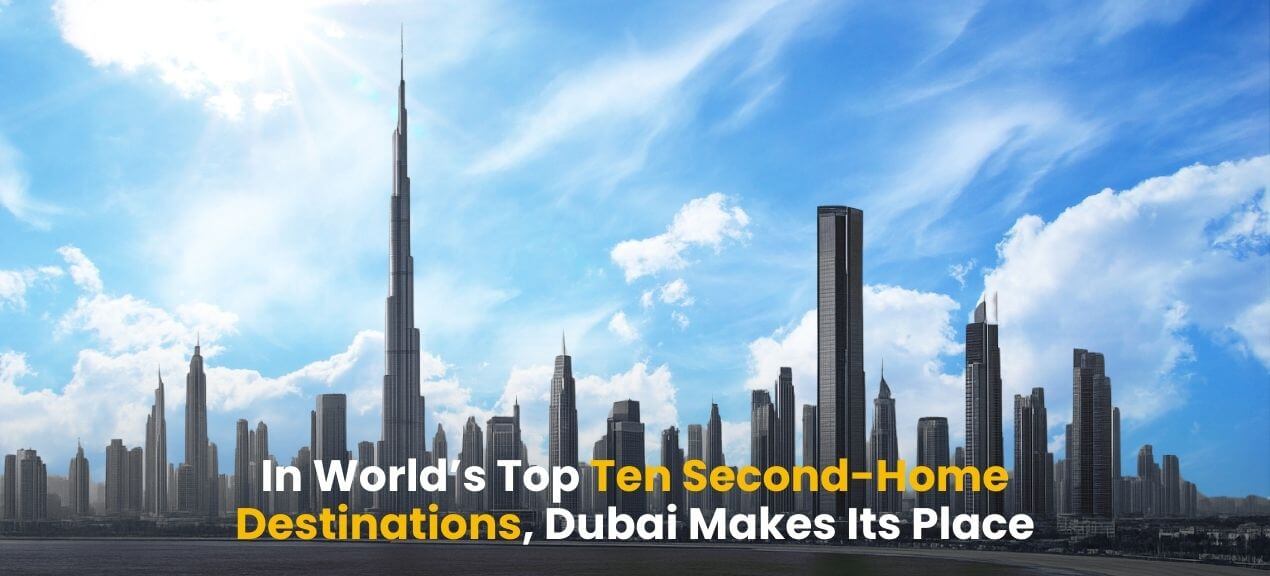
If you had $30 million or more to spend on a second home, where would you buy? Monaco? Saint-Tropez? London?
But here’s the catch: the wealthy people are skipping these areas and are heading straight to Dubai. And honestly, we’re not surprised.
A recent Altrata Wealth report has ranked Dubai in the world’s top ten second-home destinations for individuals worth $30 million or more. That’s a pretty exclusive guest list. But here’s the real story: Dubai’s appeal isn’t just for billionaires. Smart investors, ambitious professionals, and first-time buyers are all tapping into the same market for good reason.
Why Dubai Has the World’s Wealthiest Hooked
The report reveals that 1,288 of the richest people in the world own a second home in Dubai. That’s more than Geneva, Zurich, or many long-established luxury hubs. But it’s not just about yacht-spotting in the marina. The rise of Dubai is backed by a mix of tax advantages, lifestyle appeal, and solid investment fundamentals.
1. Tax Haven Without the Isolation
Zero income tax. No capital gains tax. No property tax. Investors keep more of their returns while enjoying one of the world’s most connected cities. Unlike some tax havens that feel like the middle of nowhere, Dubai is at the crossroads of Europe, Asia, and Africa, with direct flights to almost anywhere.
2. Luxury Living With Affordability
Let’s be clear here, Dubai’s prime real estate is premium. But compared to London, New York, or Monaco, you get a lot more for your money. Think beachfront penthouses, villas with private pools, and skyline apartments all at a price per square foot that makes other luxury cities look overpriced.
3. Residency Programs
Dubai’s “Golden Visa” residence program makes it easy for high-net-worth individuals and serious investors to secure long-term residency. No endless red tape. No mystery paperwork. Just a straightforward process tied to property investment.
4. A City That Works Like a Business
Dubai runs like a well-oiled machine, with an efficient infrastructure, business-friendly policies, and constant investment in innovation. The government treats the city like a brand, and it shows in everything from its airports to its real estate laws.
Dubai is Not Just for the Billionaires
Yes, the Altrata report focuses on ultra-wealthy second-home buyers, but Dubai’s growth story is accessible to more than just the top 0.01%. The same conditions that attract billionaires also benefit mid-level investors and first-time buyers.
- Stable Market: Property values have shown resilience even during global downturns.
- High Rental Yields: Dubai consistently offers some of the highest rental returns among global cities.
- Diverse Opportunities: From affordable apartments to luxury villas, the market has entry points for various budgets.
The Lifestyle Factor Dubai Offers
Numbers alone don’t explain why people fall in love with Dubai. It’s the lifestyle. Dubai shines Year-round. With iconic landmarks like the Burj Khalifa and The Palm. World-class shopping. Beaches and desert adventures all in the same day if you want.
Safety is another major draw. Dubai consistently ranks among the world’s safest cities, with low crime rates and a family-friendly environment. Top-tier schools, healthcare, and infrastructure, and it’s no wonder people aren’t just buying second homes here, but people are moving in full-time.
Why Now Is the Best Time to Buy In Dubai’s Real Estate
The demand from ultra-wealthy buyers is more than just a headline. It’s a signal. When the world’s savviest investors start moving into a market, they bring price growth with them. And combine that with Dubai’s continued economic expansion, Expo 2020’s lasting infrastructure legacy, and constant new development launches, and you have long-term appreciation.
Market momentum is real:
- 2024 saw double-digit price growth in prime areas like Palm Jumeirah and Dubai South.
- Off-plan projects are selling out faster than they launch.
- International investor interest is at an all-time high.
Comparing Dubai to Other Luxury Destinations in the World
In the Altrata Wealth rankings, Dubai competes directly with global luxury markets like Miami, London, New York, and Monaco. What sets Dubai apart is the combination of affordability, tax advantages, and ease of residency. Prime properties in Dubai range from $1,500 to $2,500 per square foot, significantly lower than London ($3,000–$6,000), New York ($4,000–$6,500), or Monaco ($5,000–$10,000+). On top of this, Dubai imposes no capital gains tax, unlike London and New York, which can reach up to 28% and 20% respectively. Residency is also simpler, thanks to Dubai’s investor-friendly programs, whereas Monaco and major Western cities have more restrictive or complex processes. This combination allows investors to enjoy luxury real estate at a fraction of the cost with fewer legal and tax hurdles.
Investment Potential in Key Areas of Dubai
If you’re looking for your own “second home” or income-generating asset, these districts are leading the charge:
- Palm Jumeirah: Iconic beachfront living with amazing resale value.
- Downtown Dubai: High rental demand driven by tourists and professionals.
- Dubai Marina: Popular with expats, high rental yields, vibrant lifestyle.
- Business Bay: Fast-growing business hub with new luxury developments.
- Jumeirah Village Circle (JVC): Affordable entry point with strong ROI.
The Bottom Line
Dubai’s position in the world’s top ten second-home destinations is not just about glitz and glamour. It’s the result of a strategic mix of policy, infrastructure, and market maturity. Whether you’re a billionaire diversifying your assets or a first-time investor looking for growth and lifestyle benefits, Dubai offers one of the most compelling property markets in the world.
And remember: while the ultra-wealthy may have private jets and mega-yachts, the fundamentals that draw them here are stability, profitability, and quality of life, which can be available to you too.
To explore more about Dubai’s booming real estate market, read our blogs and visit our website to stay informed on the latest investment opportunities, market trends, and property insights.